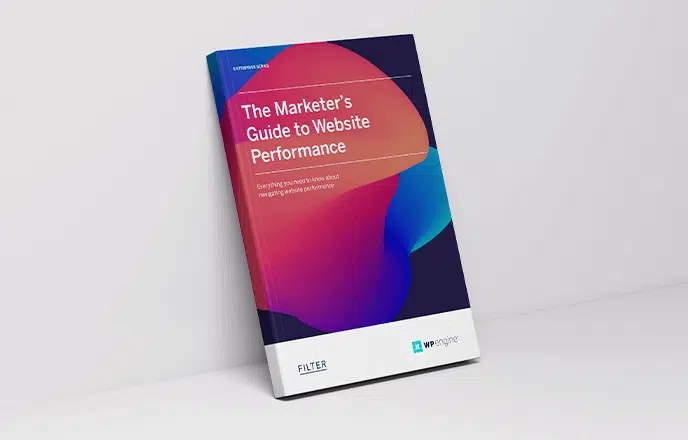
In this article, we’ll highlight some crucial opportunities you’re missing out on if you neglect to optimise your website or settle for sub-par performance.

Table of contents
Creating and maintaining a fast, high-performing website should be a priority if you’re a marketer. But it’s still something that many underestimate the importance of, or don’t devote the necessary time and resources to. As a result, they miss valuable opportunities and unwittingly turn away business.
A common misconception is to think that website performance refers to how your site contributes to your business by building interest in your services, or generating leads, subscriptions, or even sales. While that is important to measure and optimise, that’s not the type of performance we’re discussing here.
In this case, we’re looking at how well the site performs for your visitors and end-users. This comes down to crucial elements of your site like the speed at which your pages load, your site’s functionality, its responsiveness, and its overall efficiency.
Almost 70% of consumers say that page speed impacts their willingness to buy from an online retailer.
UnBounce
The performance of your website is measured by things like how fast your pages load, your site’s functionality, its responsiveness, its overall efficiency, and so on.
But these are all determined by technical factors that you, as the site’s owner, are in total control of. That means you can make adjustments if your site isn’t performing up to standard. These include:

Measuring and analysing your website’s performance holds the key to optimising it and delivering an exceptional user experience.
Website performance that satisfies the demands of your visitors is crucial. Whether or not your website performs “well enough” isn’t decided by you, it’s decided by your audience.
It’s common for more creative marketers to spend most of their time focusing on aspects of websites like design, content, and media. While these do have an influence on your overall user experience (UX), your site’s performance is just as important.
This is because performance is the foundation that comes before everything else. If your site doesn’t load quickly enough, many visitors will abandon it before giving it a chance. In these cases, they may not be around long enough to even see your design or read a word of copy.
As technology has become a more fundamental part of everyday life, our tolerance for slow, inconvenient experiences with technology has quickly dissolved. In fact, it only takes your visitors around 50 milli-seconds, or 0.05 seconds, to form an opinion about your website. That opinion will often be the basis of whether they’re going to stay or leave.
Most people want web pages to load in around one second or less, and will only tolerate a maximum of two seconds loading time. If your site isn’t consistently meeting those standards across all channels, devices, and locations, you need to make some changes.
Adding to the previous point, if you fail to meet those visitor expectations, your ability to attract and convert customers online will suffer.
Any hint of slowness or friction will create frustration, and could result in high bounce rates, abandoned transactions, negative brand reputation, and even lost business to more capable competitors.
Conversely, if you can provide your visitors with a seamless and satisfying experience, you’ll see them spending more time on your site instead of bouncing off. The longer they spend on your site, the more likely they are to purchase a product or service, and to come back again in future.
Your website’s performance influences your ranking in search engine results pages (SERPs), making it an important factor in your search engine optimisation (SEO) strategy.
If you want to be successful with SEO today, all the pages on your site need to load fast and perform well. Google’s algorithm for ranking websites in its SERPs has actually included website speed for over a decade now.
If your site performs well, it will climb the ranks, but a slow website will be buried amongst the rest of the pile. If you allow that to happen, it will drastically shrink the size of your reachable online audience.
If you’re looking to overtake your competition in organic search results, it’s necessary to spend time improving the speed of your website. It’s also important to note that this takes into consideration your site’s performance across all devices and channels, especially mobile. Keep an eye out for a related article on our blog breaking down website performance for mobile users soon.
Your web hosting provider will play a large role in determining your website’s performance, so it’s important to find a reliable service that can deliver the required speed and quality.
This is because your web host is responsible for the server infrastructure your website depends on, which influences factors like your up-time and scalability.
With a poor hosting environment, your site will be at risk of down-time, slow page loading speeds, and other issues that can have a negative effect on performance.
When looking for a host, be sure to do plenty of research. You’ll need to consider things like their back-up and disaster recovery services, whether it’s a shared or private hosting environment, what support they offer, and more.
Be clear about your non-negotiable hosting requirements up-front, and look for a host that specialises in your tech stack for additional confidence.

This article will help you understand what dictates your website’s performance, and provide tips to make improvements that will deliver a better UX for your visitors.
To improve your site’s performance, you’ll need to optimise it on a continuous basis. Begin by assessing your site’s current performance, testing all the front-end and back-end factors. You can do this using tools like PageSpeed Insights or GTmetrix.
Once you know where you stand, you can determine the steps you must take to improve. You should also set KPIs for performance, like page load speed, average session duration, bounce rate, conversion rate, and so on.
Too many marketers leave this up to chance, but you can’t maintain great website performance without measuring it regularly and optimising accordingly. Put tools and processes in place to keep a close eye on this and be prepared to act quickly any time your page load speeds begin to slow down.

If you want to read more about website performance, make sure to check out our guide to website performance. We have produced this FREE eBook in collaboration with WP Engine, exploring the vast topic of website performance.
The guide will provide you with:
Following its practical tips and advice will also help you unlock a range of other valuable benefits, including:
Here are a list of helpful links and resources to help you on your mission to improve your website performance.